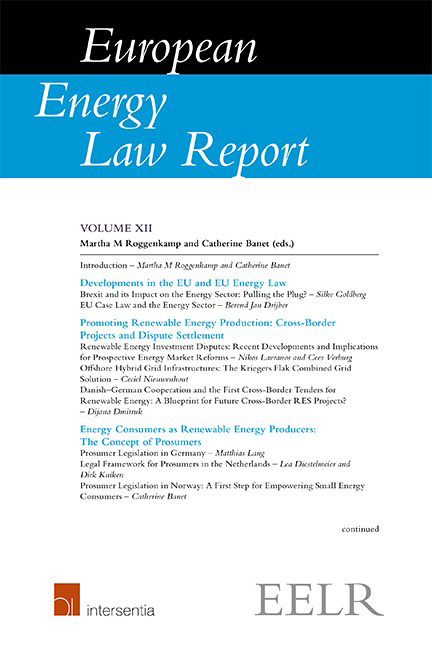Book contents
- Frontmatter
- Preface
- Contents
- List of Abbreviations
- List of Contributors
- Introduction
- PART I Developments In The EU and EU Energy Law
- PART II Promoting Renewable Energy Production: Cross-Border Projects And Dispute Settlement
- PART III Energy Consumers As Renewable Energy Producers: The Concept Of Prosumers
- Chapter VI Prosumer Legislation in Germany
- Chapter VII Legal Framework for Prosumers in the Netherlands
- Chapter VIII Prosumer Legislation in Norway: A First Step for Empowering Small Energy Consumers
- PART IV Balancing Renewable Electricity Production Withsupply Security: National Experiences With Capacity Mechanisms
- PART V Promoting The Use Of Sustainable Gas And Security Of Gas Supply
Chapter VIII - Prosumer Legislation in Norway: A First Step for Empowering Small Energy Consumers
from PART III - Energy Consumers As Renewable Energy Producers: The Concept Of Prosumers
Published online by Cambridge University Press: 31 January 2019
- Frontmatter
- Preface
- Contents
- List of Abbreviations
- List of Contributors
- Introduction
- PART I Developments In The EU and EU Energy Law
- PART II Promoting Renewable Energy Production: Cross-Border Projects And Dispute Settlement
- PART III Energy Consumers As Renewable Energy Producers: The Concept Of Prosumers
- Chapter VI Prosumer Legislation in Germany
- Chapter VII Legal Framework for Prosumers in the Netherlands
- Chapter VIII Prosumer Legislation in Norway: A First Step for Empowering Small Energy Consumers
- PART IV Balancing Renewable Electricity Production Withsupply Security: National Experiences With Capacity Mechanisms
- PART V Promoting The Use Of Sustainable Gas And Security Of Gas Supply
Summary
INTRODUCTION
Electricity generation in Norway is almost totally based on renewable energy sources, mostly hydropower (96.3 % in 2016), followed by thermal power (2.3 %) and wind power (1.4 %). The price of electricity for end-users is also relatively low compared to the rest of Europe. The absence of an immediate need to ’ green ‘ the energy generation mix any further or to generate cheaper electricity explains the absence, for the majority of energy consumers, of a strong need to start producing electricity themselves and to turn into prosumers. This can be illustrated by the fact that in early 2018 only 1,000 Norwegian consumers have become prosumers.
Meanwhile, households and other small energy consumers are becoming increasingly aware of the existing opportunities and may find new financial motivations in higher electricity prices. As elsewhere, the costs of solar panels are continuously decreasing, and both attractive and innovative market offers are focusing on prosumers as a market segment. As such, the increase in electricity prices may motivate energy consumers to develop a hedging strategy by producing more electricity themselves. In the first half of 2018, electricity prices have risen significantly compared to previous years because of higher consumption due to a cold winter and because of higher and more expensive imports than usual due to a dry spring. This situation worried consumers, but is expected to return to normal shortly; however, a certain fact is that grid tariff s will increase in the near future due to the need for grid investments. Finally, many Norwegian consumers find the idea of consuming self-produced electricity attractive, in particular when this electricity is based on renewable energy sources. In fact, the vast majority of registered prosumers make use of solar panels, followed by a small number using hydropower, which is traditionally very common in Norway. The topology of the country is such that many landowners develop mini- and micro hydropower plants, primarily for their own consumption, making smallscale hydropower an established practice in the countryside, based on enabling legislation. The prospect of developing smart houses and buildings that are not only achieving zero-emissions, but which are also energy positive, is a growing trend. Still, prosumers are a minority.
- Type
- Chapter
- Information
- European Energy Law Report XII , pp. 169 - 190Publisher: IntersentiaPrint publication year: 2018
- 1
- Cited by



